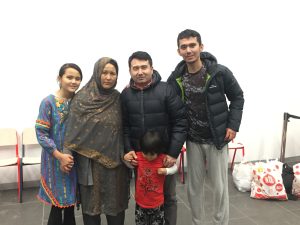Afghan evacuees feel welcome and safe – survey
Afghan families evacuated from of Kabul as it fell to the Taliban 18 months ago are feeling welcome, safe and confident about their futures, a new survey has found.
Among the things they value about life in Australia are security and safety, career and educational opportunities and health care.
But their biggest issues are the rising cost of living and fear of unemployment. But almost a third plan to start a business.
In August 2021 as the Taliban seized control of Afghanistan’s capital Kabul, thousands of ‘locally employed or engaged’ Afghans were airlifted out of the city by the Australian Government and allied countries.
 Eighteen months later, a survey commissioned by refugee and migrant settlement agency AMES Australia, has tracked how they are faring in various aspects of their lives. It canvased 102 people among a cohort of 3000 who arrived in September and October 2021.
Eighteen months later, a survey commissioned by refugee and migrant settlement agency AMES Australia, has tracked how they are faring in various aspects of their lives. It canvased 102 people among a cohort of 3000 who arrived in September and October 2021.
Asked whether they felt welcome in Australia, an overwhelming number (96 per cent) said they did feel welcome or did most of the time.
Ninety-two per cent said they found ordinary people welcoming and 83 per cent found government and official institutions welcoming.
Security and safety was cited by 39 per cent of respondents as the ‘best thing about living Australia’, followed by education (26 per cent) and career opportunities (17 per cent) while 12 per cent cited health care.
Among the worst things cited about life in Australia were ‘missing family and friends’ (61 per cent), ‘language barrier’ (12.4 per cent) and ‘lack of work’ (9 per cent).
The rising cost of living was the ‘biggest fear’ about life in Australia into the future, identified by 78 per cent of respondents, followed by unemployment (11 per cent) and housing (7 per cent).
Getting a job and starting a business were the main short to medium term goals cited by survey respondents scoring 38 and 28 per cent respectively.
‘Leaving family back in Afghanistan’ was cited as the biggest barrier to getting on with life in Australia (38 per cent), followed by a ‘lack of English language’ (37 per cent and ‘feeling isolated’ (12 per cent).
Only three percent of those surveyed said they had experienced discrimination of racism. Seventy-eight per cent said they had not and 19 per cent said they had experienced discrimination ‘only sometimes’.
A third of people said life in Australia was as they had expected it to be, while 57 per cent said it was ‘mostly’ as expected.
Most unexpected about life in Australia among the Afghan arrivals were ‘cultural freedoms and permissiveness’ (18 per cent), ‘high cost of living’ (16 per cent), ‘free health care’ (16 per cent), ‘multiculturalism and diversity’ (15 per cent) and the ‘availability of work (14 per cent).
Eight four per cent of respondents were ‘happy with their life in Australia’ and the rest were ‘mostly happy’ while 97 per cent were either ‘happy’ or ‘mostly happy’ with their employment and educational pathways in Australia.
Asked what has been the most important support received since arriving in Australia, 32 per cent cited ‘support with accommodation and necessities on arrival, 24 per cent said ‘Centrelink benefits’ and 10 per cent said ‘English language lessons’.
Sixty-eight per cent of respondents said they were ‘satisfied with the ongoing support’ they are receiving since arriving Australia and 22 per cent said they were ‘mostly satisfied’.
Asked whether they intended to stay in Australia or would return to Afghanistan if the situation there improved, 75 per cent said they intended to stay while 12 per cent said they would return and 13 per cent were unsure.
AMES Australia CEO said the survey result showed the Afghan evacuees were grateful to be in Australia and intent on building new lives here.
“What comes through in survey is that the Afghans, many of whom were torn from their lives at short notice and in traumatic circumstances, are incredibly resilient and they are intent on rebuilding their lives and on becoming part of Australian society,” Ms Scarth said.
“We can also see that many are entrepreneurial and plan to start businesses,” she said.
Afghan evacuee Amin Niazai is an Afghan forester with a doctorate Forestry and Biomaterials. He has completed a state government internship and is about start work on a bushfire research project at RMIT.
“My family is safe here in Australia and we have an opportunity to move on with our lives,” Amin said.
He is looking forward to re-establishing his career in forestry research.
“I would like to contribute to the forestry discipline here in Australia. Maybe I can gain some experience and build on my ideas on forestry,” Amin said.
“Who knows, maybe one day this will help me go back to Afghanistan and realise my dream of rebuilding my homeland,” he said.
Hamidreza Arfany came with his mother and sisters on an evacuation flight. He is starting Year 11 this year.
Hamid says he feels welcome and supported in is new community.
“We have everything we need in Dandenong. There are other members of our community living nearby, we can buy the food and other things we are familiar with – and the local council has programs that support us,” he said.
“We feel comfortable because there are many people from many places across the world. We are not different, in Dandenong being form somewhere else in normal,” Hamid said.












